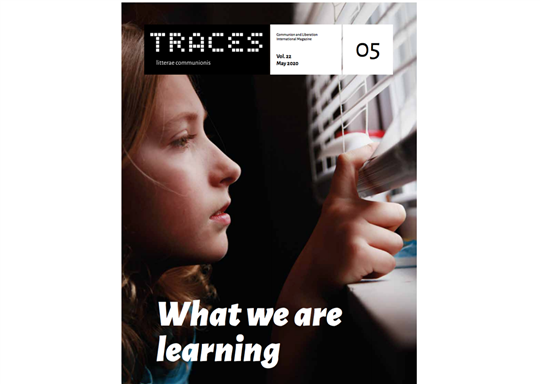
TRACES N.5, MAY 2020
The time of our judgementIt was a historic moment, one that was immediately stamped into our memory and will remain fixed there forever. The darkness falling over the empty square. The rain that fell harder and harder. And a man dressed in white who, standing before the crucified, called out to God with the words of the disciples: “Teacher, do you not care if we perish?” Do you not care about me, about us? It was a scene similar to those we would see two weeks later in an equally unprecedented Holy Week: Holy Thursday Mass in Coena Domini, the Way of the Cross, Easter... all pared down to their bare essentials. The pope and a handful of others–and the presence of Christ.
That prayer at the end of March, with Pope Francis crying out in a square that had never been so deserted, laid out a road, an invaluable road for those trying to follow. As the pope said, this unrivaled circumstance–capable of “exposing our vulnerability,” upending our “false and superfluous certainties around which we have constructed our daily schedules,” and giving us direct experience of how much we need the risen Christ, is not a condemnation. Instead, it is an opportunity–a great one.
This is “the time of our judgment.” Not “of Your judgment,” Pope Francis insisted, boldly addressing God, “but of our judgment: a time to choose what matters and what passes away, a time to separate what is necessary from what is not.” It is the time of conversion, where that word no longer corresponds to any kind of moralism, as if it were just an ethical effort: what is asked of us is a particular gaze on reality. To whom do we look? What do we seek? What is needed is a step that occurs at the level of knowledge.
This has been the message of many people, expressed in many ways, over the last weeks, and you will find examples in the following pages. If this dramatic emergency were to simply pass by without an increase in our awareness, that would be one more misfortune on top of the insupportable weight of so much death. Even worse: it would lay another stone on the tomb of our humanity, leaving us even more lost and empty than before.
Yet this dizzying time can be very different. It can be an opportunity to “reawaken our humanity,” as indicated by the title of a booklet that has come out containing an extended interview with Fr. Julián Carrón, the president of the Fraternity of CL, which, fully accounting for the “forceful irruption of reality” that “made the full weight of that need to understand, which we call ‘reason’ emerge again,” grapples with the questions we all have, skipping over nothing and taking no shortcuts. It addresses the inevitable questions that have arisen and argues that we must choose to take them seriously. This booklet (available at english.clonline.org) will in some way accompany our attempts to do so.